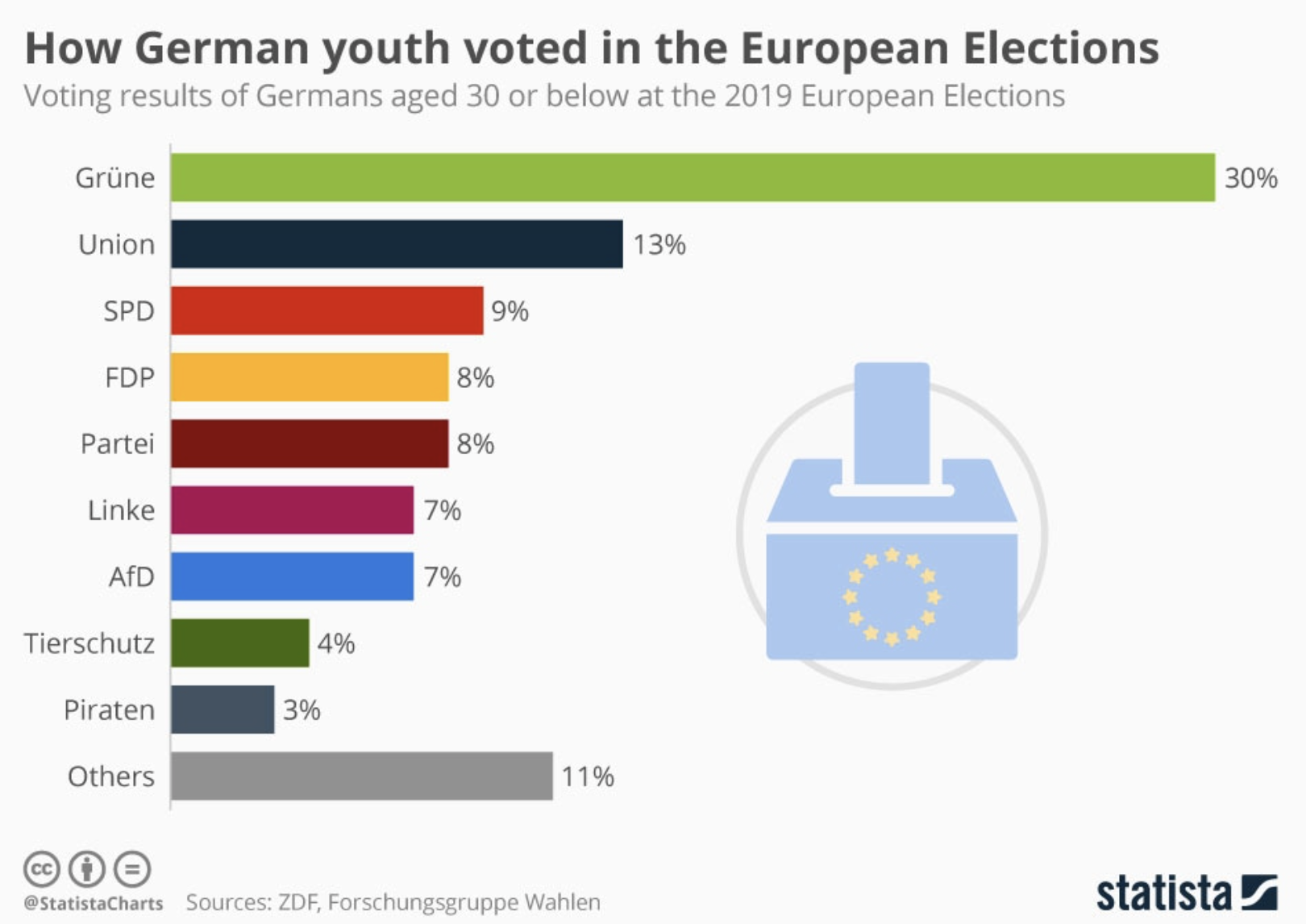Saxo Bank Q3 Predictions: The Greens have reached maturity
At the federal level, the election campaign of Germany is gaining momentum and significant changes await us. For the first time in history, forty years after the party was founded, the Greens have a chance to become the dominant party in the federal government. If the polls are correct, this would be the first election since World War II in which the combined forces of the CDU / CSU and the SPD would not win a majority. This would be a historic change for Germany and for the group itself, formed on the wave of student and popular protests and previously perceived as a party of economically irresponsible radicals and extreme idealists.
About the Author
 Eleanor Creagh, analyst Saxo Bank. She joined the group Saxo Bank in 2018 as Australian Market Strategist. She is responsible for developing, implementing and monitoring capital strategies and research for entrepreneurs and investors, as well as developing quantitative models and a customized mathematical framework for institutional clients. He supports the Global Sales Trading team at Saxo Bank with his ideas and insights into the financial market, helping traders and investors to adjust to the current market situation.
Eleanor Creagh, analyst Saxo Bank. She joined the group Saxo Bank in 2018 as Australian Market Strategist. She is responsible for developing, implementing and monitoring capital strategies and research for entrepreneurs and investors, as well as developing quantitative models and a customized mathematical framework for institutional clients. He supports the Global Sales Trading team at Saxo Bank with his ideas and insights into the financial market, helping traders and investors to adjust to the current market situation.
The recent success of the Greens highlights a generational shift in policy, with ideas about environmental protection and social progress increasingly mainstreaming. We are dealing with a new generation committed to tackling climate change and reducing it carbon dioxide emissionsas well as ensuring equality and social justice, thus shaping policy for the years to come.
Bündnis 90 / Die Grünen (Green Party), once known as the "anti-party party", has matured simultaneously with the Millennials and Generation Z shifting the political center of gravity to the left. According to Eurobarometer, which has been conducting regular surveys of the population of all EU Member States since 1973, an increasing number of Millennials and Gen Z describe themselves as leftists.
Moving away from its roots in the 80s. The Greens have moved closer to the center, reaching maturity as a more united moderate political forcewhich is clearly gaining in popularity. The party is currently ranked second in national polls and is ready to join the new coalition government of the Federal Republic of Germany after the September elections. While the real composition of the ruling coalition that will emerge after the federal elections remains an unknown, the Greens are already convinced that they will play a role in it. A significant contribution to the formation of the new government as part of our black and green coalition base scenario, or a potential victory and Annalena Baerbock as the first Green member as chancellor, would represent a clear shift as the Greens would play a vital role in shaping German and EU policy in the years to come.
Youth earthquake, climate crisis and moderate center
The success of the Greens is partly the result of the increasing emphasis on combating the climate crisis and environmental protection, as well as opposition to the inadequate climate policy so far. After the youth climate strike "Fridays for the Future" took 1,4 million people to the streets and social justice movements such as Black Lives Matter called for a fight, the Green Party, which correctly read zeitgeist these events has grown considerably in popularity. Its long-standing emphasis on climate change ensures its credibility as its principles reach the majority of the electorate.
In the opinion of many voters, Angela Merkel's actions on climate issues were disappointing, which paved the way for the Greens. Germany failed to meet its 2020 climate target of reducing emissions by 40% compared to 1990 levels; the only salvation was the pandemic, which closed the homes of the whole world and limited the growth of carbon dioxide emissions. According to one poll, 51% of German voters cited "the fight against climate change and the protection of the environment" as the most important topic.
During the 2019 European elections, the efforts of young climate activists to revitalize European climate policy paid off as one in five German voters voted for the Green Party. However, the greatest strength turned out to be the youth, who show the most resolute attitude to climate issues: among people under 30, the Greens obtained as much as 30% of the total vote. Climate change is not affected by political polarization in this age cohort.
However, the split appeared for voters over the age of 65, with the proportions reversed, pointing to a generational gap that can only grow as the young electorate puts climate change to the fore. In 2019, however, the average age of the German population was 44,5 years. In fact, Germany has the highest average age of any European country and the proportion of people over 65 is steadily increasing. Currently, 21,8% of Germans are over 65, only 10,3% are 15-24, and almost 70% of all voters are over 10. In contrast to the United States, where the largest generation group are millennials, in Germany, millennials and Gen Z will not make up the majority of the total vote until at least XNUMX years. Therefore, while demographic trends and an increasing emphasis on climate issues play and will continue to play an important role in the growing popularity of the Greens, this is not a complete picture of the situation.
Over the past few decades, this party has moved towards the center, targeting both the older and younger electorate after the Greens' policy so far has moved into the mainstream. As voters moved left, the Greens moved to the center and former radicals are now seen as "everyone's party." "Radical realism" has become a popular slogan for the Greens. The average age of the group's members is 48, and 60% of them are women. Today's Greens' electorate is usually city-dwelling white-collar workers from economically strong regions, many of whom grew up alongside this party, upholding the core founding values of sustainable development, environmental protection and social justice.
Structural factors also contributed to the recent success of the Greens, as in Germany (as in many other developed countries) the political center has declined as the far-right has grown in popularity. This has enabled the Green Party to attract the disenchanted electorate in the middle as a counterbalance to right-wing nationalism, and the party is now reaching even the traditionally conservative regions of Germany.
Europe again a leader in terms of climate change?
What does this mean for the markets? The growing number of Green supporters is an opportunity for this party to lead a series of structural changes, as well as a progressive program of decarbonisation and environmental protection, both in Germany, the largest EU economy, and throughout Europe - it is a real revolution!
The party's policy remains faithful to its founding principles, and the party manifesto mentions equality, social justice and humanitarian issues as the basis of a sustainable and environmental policy. The party's main commitment is to reduce its greenhouse gas emissions by 2030% by 70 from 1990 levels. - This is a significant increase over the current 55% reduction target that could put Germany ahead of the EU's Green New Deal objectives. The implementation of this commitment assumes the phasing out of coal energy by 2030, accelerating the transition of Germany to energy from renewable sources, investment expenditure on green infrastructure and the approval of only zero-emission vehicles from 2030. This will accelerate the development of renewable energy and progress in decarbonisation along with the necessary actions to limit the increase in global warming above pre-industrial levels to 1,5 ° C.
In terms of leadership in technology, Germany has lagged behind in recent years. Patent data shows that over the past ten years, Germany's advancement in next-generation technology has declined in importance. While Germany was in the top three for 2000 technologies in 47, research showed that in 2019 only 22 technologies were involved.
Preparing the German economic model for the coming decades requires proactive measures to win the green technology race, which would be an opportunity to strengthen Europe's position as a leader on climate change. In this respect, the Green Party is clearly a strong candidate for building a new Germany and securing its future.
Moreover, the Greens unequivocally support globalization and the European Union, seeking to increase the influence of the EU as a "global player", supporting the deepening of European integration and promoting the idea of a strong state increasing budget spending against German conservatism. They are in favor of a revision of the German constitutional 'debt brake', which limits federal structural deficits to 0,35% of GDP, and an increase in investment to EUR 50 billion a year. According to the party's platform, “an intelligent entrepreneur does not save, but only invests. The same goes for an intelligent state. "
The victory of the Greens or the significant participation of this group in the composition of the new government, combined with the influence of Germany in the EU, will provide the potential to shape the German and EU political agenda in the coming years, deepen European integration and strengthen the role of the European Parliament. The Greens are in favor of the centralization of power in the Union and the federalisation of Europe - a change that would accelerate the last pandemic shift towards fiscal dominance and, in the case of Europe, a common fiscal policy. Over time, this may lead to the creation of a future fiscal union on the foundations of the EU pandemic reconstruction fund, with an emphasis on prioritizing fiscal policy broadly understood social goals and the distribution of income and assets, as well as green transformation. This is very different from the austerity regime of recent years, which contributed to the consolidation of slower, lower economic growth; for Europe, it could mean the beginning of a new era.






















![Forex Club – Tax 9 – Settle tax on a foreign broker [Download the Application] Forex Club - Tax 9](https://forexclub.pl/wp-content/uploads/2024/02/Forex-Club-Podatek-9-184x120.jpg?v=1709046278)
![Trading View platform – solutions tailored to the needs of traders [Review] trading view review](https://forexclub.pl/wp-content/uploads/2024/03/trading-view-recenzja-184x120.jpg?v=1709558918)
![How to connect your FP Markets account to the Trading View platform [Guide] fp markets trading view](https://forexclub.pl/wp-content/uploads/2024/02/fp-markets-trading-view-184x120.jpg?v=1708677291)
![How to invest in ChatGPT and AI? Stocks and ETFs [Guide] how to invest in chatgpt and artificial intelligence](https://forexclub.pl/wp-content/uploads/2023/02/jak-inwestowac-w-chatgpt-i-sztuczna-inteligencje-184x120.jpg?v=1676364263)


![WeWork – the anatomy of the collapse of a company valued at $47 billion [WeWork, part II] wework bankruptcy story](https://forexclub.pl/wp-content/uploads/2024/04/wework-bankructwo-historia-184x120.jpg?v=1711729561)
![Adam Neumann – the man who screwed up Softbank [WeWork, part AND] adam neumann wework](https://forexclub.pl/wp-content/uploads/2024/04/adam-neumann-wework-184x120.jpg?v=1711728724)





![How to transfer shares to another brokerage office [Procedure description] how to transfer shares to another brokerage house](https://forexclub.pl/wp-content/uploads/2024/03/jak-przeniesc-akcje-do-innego-biura-maklerskiego-184x120.jpg?v=1709556924)

![The most common mistakes of a beginner trader - Mr Yogi [VIDEO] Scalping - The most common mistakes of a beginner trader - VIDEO](https://forexclub.pl/wp-content/uploads/2024/03/Scalping-Najczestsze-bledy-poczatkujacego-tradera-VIDEO-184x120.jpg?v=1711601376)
![Learning patience: No position is also a position - Mr Yogi [VIDEO] Scalping - Learning patience - No position is also a position - VIDEO](https://forexclub.pl/wp-content/uploads/2024/03/Scalping-Nauka-cierpliwosci-Brak-pozycji-to-tez-pozycja-VIDEO-184x120.jpg?v=1710999249)
![When to exit a position and how to minimize losses - Mr Yogi [VIDEO] Scalping - When to exit a position and how to minimize losses - VIDEO](https://forexclub.pl/wp-content/uploads/2024/03/Scalping-Kiedy-wyjsc-z-pozycji-i-jak-minimalizowac-straty-VIDEO-184x120.jpg?v=1710336731)


















